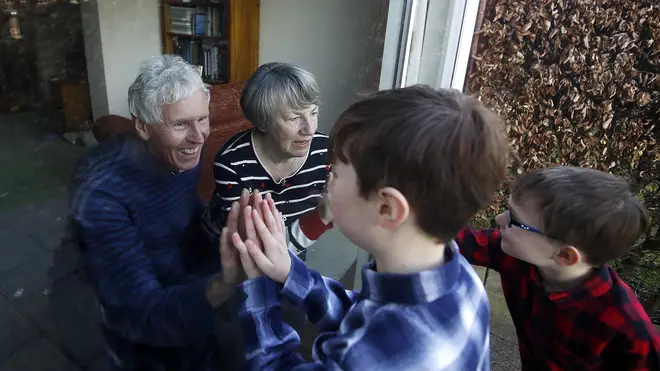
Matt Frei 10am - 12pm
1 November 2020, 18:40

England’s second national lockdown in winter could be “the greatest test” of people’s mental health, charities fear.
Campaigners say there is an “urgent need” for a winter mental health support package including in-person and online services as the country braces for a month-long shutdown from Thursday until 2 December.
Pubs, restaurants, gyms and non-essential shops will shut along with entertainment and leisure sectors. Schools, colleges, universities and industries that cannot work from home can stay open.
The public “must stay at home” from Thursday, Boris Johnson said, but exercise, trips to supermarkets and for other essential reasons such as work and education are permitted.
Paul Farmer, chief executive of mental health charity Mind, said it could be “the greatest test of our mental health this year”, not just for the public but for healthcare staff who are “working tirelessly, but may be struggling with their mental health too”.
Read more: What you can and can't do under second national lockdown
Read more: Children excluded from two-person meeting limit in new rules

Desmond Swayne condemns Government national lockdown decision
Both Mind and Carers UK say the Government has to learn from mistakes in the first wave and make sure people can get help early on.
Many leading scientists have warned that the costs of lockdown on the economy, wellbeing and missed operations could outweigh the benefits.
Caroline Abrahams, Age UK’s charity director, said as many as one in three older people were already struggling with anxiety, depression and loneliness brought on by the pandemic.
Read more: England braces for month-long lockdown to avoid NHS crisis
Read more: Keir Starmer condemns delay in England lockdown
“Older people are typically extremely resilient, but this second period of prolonged disruption to daily life and enforced isolation will hit some very hard,” she said.
“Now we are worried about how they will cope these next few weeks, especially if they are living alone, are on a tight income and with little if any family or other support.”

Former CSA Professor Sir Mark Walport on new lockdown measures
Hobbies and gentle exercise may help some people who are trying to cope with the second lockdown but “for some this simply won’t be enough” to take the edge off them feeling low, especially with gyms set to shut.
Getting in touch with a GP could help but it is important for people generally to try and look out for older people, she added. The Prime Minister urged people to keep using the NHS if they need it.
Brian Dow, deputy chief executive of Rethink Mental Illness, said: “The sense of social isolation and loneliness that lockdown exacerbates, compounded by significant changes to routine and restricted access to support networks and services, has a significant impact on people living with mental illness.
“It doesn’t mean a few blue days or that life feels a bit harder, it may trigger a relapse which can be take years to recover from.”
Research by Rethink Mental Illness carried out during the first lockdown showed that 79% of people living with mental illness said their mental health was worse because of the pandemic.
More than 2.3 million people visited rethink.org for advice and information in the six months since the spring lockdown began, including a 183% increase in the number of people seeking information about anxiety disorders and a 188% increase in those seeking to support someone experiencing suicidal thoughts.
Emily Holzhausen, of Carers UK, said that “people have really felt pushed to the absolute limit and in terms of their mental health and wellbeing” during the pandemic.
The Government has pledged to write to everybody who is clinically extremely vulnerable to set out detailed advice for the second lockdown, but has not urged people to return to shielding.
Samaritans are on hand 24 hours a day to listen and offer non-judgemental support. You can call for free on 116 123 or email jo@smaritans.org. You can also visit www.samaritans.org.
A statement from Samaritans said: “There’s no doubt that these uncertain and challenging times have affected the way we go about our daily lives.
“As social restrictions and uncertainty continues, it is essential that we look after our own mental health and others by continuing to check in on one another and sharing how we are feeling, whether it’s with a friend, family member or a confidential helpline like Samaritans."